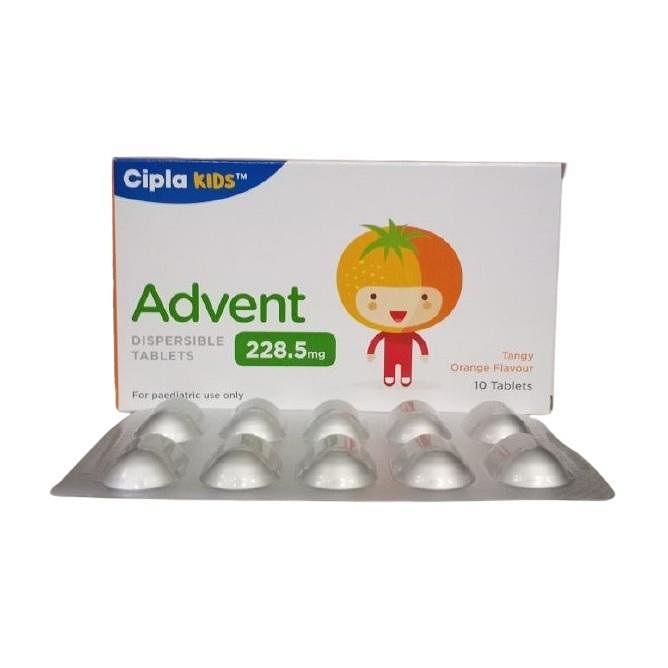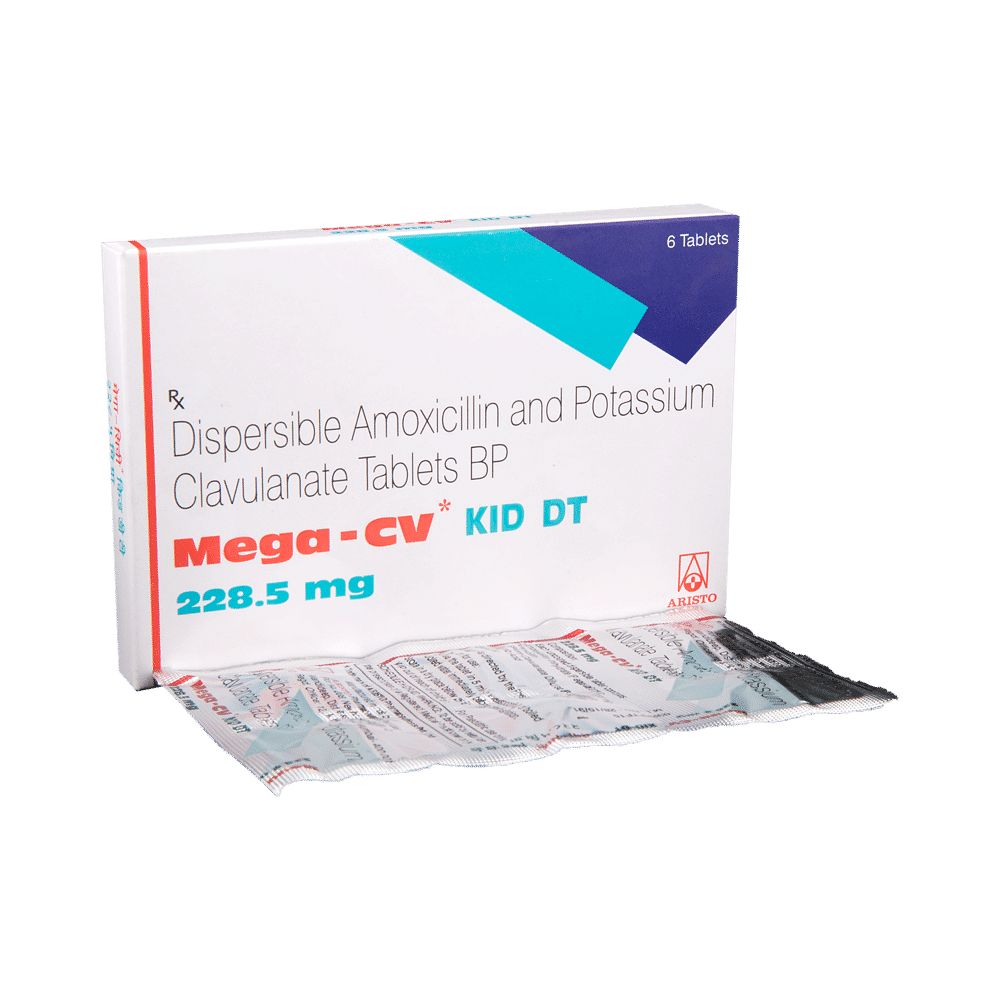
Penom Clav 200mg/28.5mg Tablet DT
Manufacturer
Apostle Remedies
Salt Composition
Amoxycillin (200mg) + Clavulanic Acid (28.5mg)
Key Information
Short Description
Penom Clav 200mg/28.5mg Tablet DT is an antibiotic medicine that helps treat bacterial infections of the ear, nose, throat, chest, lungs, teeth, skin, and urinary tract.
Dosage Form
Tablet DT
Introduction
Penom Clav 200mg/28.5mg Tablet DT is an antibiotic medicine that helps treat bacterial infections of the ear, nose, throat, chest, lungs, teeth, skin, and urinary tract. It is capable of killing bacteria that have become resistant to other therapies and thus also helps treat tuberculosis that is resistant to other treatments.
Directions for Use
Your child must complete the entire course of antibiotics. Stopping too soon may cause the bacteria to multiply again or cause another infection.
How it works
Penom Clav 200mg/28.5mg Tablet DT is an antibiotic. It has two active agents amoxycillin and clavulanic acid. Amoxycillin works by preventing the formation of the bacterial protective covering (cell wall) essential for the survival of the bacteria. Whereas clavulanic acid serves a special purpose of inhibiting an enzyme (beta-lactamase) that is produced by resistant bacteria. This makes the combination of amoxycillin and clavulanic acid an effective line of treatment for many types of infections.
Quick Tips
Your child must complete the entire course of antibiotics. Stopping too soon may cause the bacteria to multiply again or cause another infection. Your child may have a bitter taste in the mouth after the intake of Penom Clav 200mg/28.5mg Tablet DT. Eating citrus fruit or sipping plenty of water or fruit juice may help. Encourage your child to drink plenty of water in case diarrhea develops as a side effect. Never give Penom Clav 200mg/28.5mg Tablet DT until and unless prescribed by the doctor. Do not give Penom Clav 200mg/28.5mg Tablet DT to treat common cold and flu-like symptoms caused by viruses. Never save medicine for future illnesses. Check ‘expiry’ before giving Penom Clav 200mg/28.5mg Tablet DT to your child. Stop Penom Clav 200mg/28.5mg Tablet DT immediately if your child develops an itchy rash, facial swelling, or breathing difficulty.
Related Medicines

Advent 200mg/28.5mg Tablet DT

Mega CV 200mg/28.5mg Tablet DT

Clavtop 200mg/28.5mg Tablet DT

Delpoclav 228.5mg Tablet DT

Cledomox Kid 200mg/28.5mg Tablet DT

Mega-CV Kid Tablet DT

Zyloprim 200mg/28.5mg Tablet DT

Augpen Kid 200 mg/28.5 mg Tablet DT

Moxymore 200mg/28.5mg Tablet DT

Moxid CV 200mg/28.5mg Tablet DT
Frequently asked questions
Can other medicines be given at the same time as Penom Clav 200mg/28.5mg Tablet DT?
It is important to inform your child's doctor about all medications your child is currently taking before starting Penom Clav 200mg/28.5mg Tablet DT. It is also advised to check with your child's doctor before giving any medicine to your child.
Can I get my child vaccinated while on treatment with Penom Clav 200mg/28.5mg Tablet DT?
Antibiotics do not usually interfere with the ingredients in vaccines and do not cause a negative reaction in children who have just been vaccinated. However, it is recommended to wait until your child recovers from any illness before administering the vaccine. Once your child is feeling better, the vaccine can be given.
Which lab tests may my child undergo while taking Penom Clav 200mg/28.5mg Tablet DT on a long-term basis?
Regularly monitoring kidney and liver function is recommended for children who are receiving prolonged therapy with Penom Clav 200mg/28.5mg Tablet DT.
Can I give a higher than the recommended dose of Penom Clav 200mg/28.5mg Tablet DT to my child?
Giving a higher dosage of this medicine can increase the risk of side effects. If your child experiences increased severity of symptoms, consult with their doctor for re-evaluation.
Can I stop giving Penom Clav 200mg/28.5mg Tablet DT to my child when the symptoms are relieved?
It is not advisable to stop giving this medicine until the full course of treatment is complete, even if you feel better. Symptoms may improve before the infection is fully cured. Therefore, continue administering the medication according to the doctor's instructions.
Can the use of Penom Clav 200mg/28.5mg Tablet DT cause diarrhea?
Yes, Penom Clav 200mg/28.5mg Tablet DT can sometimes cause diarrhea. It is an antibiotic that kills harmful bacteria and also affects the beneficial bacteria in your child's stomach, leading to diarrhea. Encourage your child to drink plenty of fluids if they experience diarrhea. If diarrhea persists or you notice signs of dehydration (decreased urination with dark-colored and strong-smelling urine), talk to their doctor before administering any additional medication.
Do all viral common colds result in secondary bacterial infection?
Most viral infections do not lead to secondary bacterial infections. It is not recommended to give antibiotics unless your child's doctor prescribes them, as they may lead to side effects. If your child experiences symptoms such as difficulty breathing or severe pain after a common cold, seeking medical advice is crucial.
The mucus coming out of my child’s nose is yellow-green. Is it a sign of a bacterial infection?
Yellow or green mucus from the nose does not necessarily indicate a bacterial infection, and treatment may not be necessary. In the case of a common cold, mucus tends to thicken and change color from clear to yellow or green. The symptoms usually subside within 7-10 days.
Is there any sign which shows that my child needs immediate medical attention?
You should immediately contact your child's doctor if your child experiences severe allergic reactions (difficulty breathing, skin rashes), gastrointestinal issues (diarrhea), or liver damage (weakness, paleness, vomiting). These side effects can be serious, and a medical professional needs to assess the situation.


